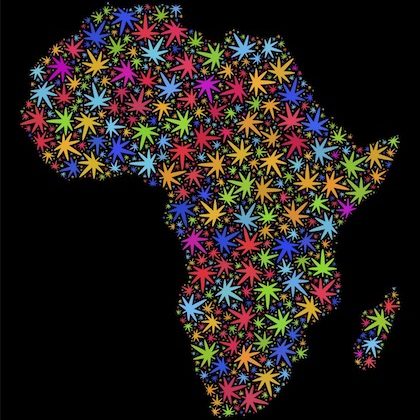
Nations in Africa look deeper into cannabis. Photo credit: New Design Illustrations.
Africa is historic in the essence of cannabis, specifically, for its cultivation and landrace strains. But as more countries move forward with pro-cannabis policies, the plant may also be a future economic driver for nations throughout Africa.
Cannabis Enters Africa
About 1,000 years ago, cannabis first entered Africa from its homeland in Southern Asia only to be found in Madagascar and the Mediterranean Coast. It was (and remains) valued in African culture and smoked in pipes, a practice invented in Africa, reports the Oxford Research Encyclopedia.
Cannabis is now one of Africa’s fastest growing crops on the continent, according to Foreign Policy.
In rural communities, cannabis is a cash crop that is another source of income, reports the Echo Geo journal. But depending on which country in Africa, it may be legal or illegal to cultivate the crop.
For example, in 2017, Lesotho became the first country in Africa to grant licenses for medical cannabis cultivation. This is strictly for scientific and medical purposes only, according to Quartz Africa.
Shortly after, other countries followed, including Zimbabwe, South Africa, Malawi, eSwatini, Zambia, Uganda, Ghana, and Rwanda, according to Empower Africa. These countries allow the cultivation of cannabis strictly for medical intention.
In particular, Uganda and Rwanda allow cultivation and the consumption of cannabis for medical purposes; their sole focus is growing the plants strictly for exports. Malawi and eSwatini, however, allow cultivation for industrial, in addition to medicinal, purposes.
Other areas in Africa, such as Ghana, allow hemp cultivation, but strictly focus on THC levels of 0.3% or less. For clarification, hemp contains THC levels of 0.3% or less, whereas cannabis has high amounts, according to Healthline.
In most cases cannabis is not legal in other parts of the continent. For example, Tanzania and Kenya have not not legalized cannabis, but many cultivate it illegally. According to Sensi Seeds the government in Tanzania is eradicating cannabis cultivation completely. Kenya conversely does not allow its use or cultivation.
Since cannabis’ arrival on the continent hundreds of years ago, cultivation of the plant has proliferated. The cultivars that farmers came to grow throughout Africa developed certain characteristics; many of those are sought after, and crossbred to create the modern strains consumers know and love today.
African Landrace Strains
There are lots of different strains that consumers can now pick from. Most strains are created from a cross of other strains. For example, the ever-popular Blue Dream strain is a cross between Blueberry and Haze.
But imagine a strain with unique characteristics and one which developed specifically to certains environments. This is called a landrace strain. Africa is well known for cultivating these strains like Kwazulu and many more.
According to Cannabis Training University, a landrace strain is one of the varieties of cannabis that has pure genetics, which have not been diluted with any other cannabis strain. Landraces are not crossbred, but breeders may crossbreed them to produce hybrid strains.
African landrace strains, such as Power Plant, contain the highest levels of tetrahydrocannabivarin (THCV). The cannabinoid has many therapeutic benefits’ for example, it may help in the regulation of blood sugar and appetite suppression, according to marketer, Brian D. Colwell.
Another renowned landrace strain is Durban Poison, which originated from Durban, South Africa. It contains 15 -25% THC. According to Cannabiz Africa, this strain provides a clear, engaged cerebral high that stimulates motivation, creativity and avoids couchlock.
Another African landrace strain is Swazi Gold which originates from Swaziland in Southern Africa. According to Swazi Gold, it contains 18-27% THC. Additionally, it has fast acting effects including a headrush and long lasting cerebral high. This increases motivation and stimulates appetite.
Yet another African landrace strain is Malawi Gold and it originated from the Salima region in Malawi. This flavorful and crisp strain contains 14-27% THC, making it a potent, pure sativa, according to Herb Co.
Users know it for producing a long lasting cerebral high, stimulating creativity and an energetic buzz.
With such famous namesake strains, the continent holds a lot of potential for the cannabis industry.
Economic Incentives
Many African countries traditionally profit off of exporting goods such as cocoa, cotton and maize. But with prices constantly changing in the global market, the source of income becomes unreliable.
This is where cannabis provides economic and job opportunities. According to Quince Market Insights, it is worth $19.89 billion globally in 2021.
Zimbabwe has taken its chance on legalization for medical and scientific purposes. Zimbabwean finance minister, Mthulia Ncube, said cannabis production could generate $1.3 billion in 2021, making it one of the country’s most profitable business, reports Foreign Policy.
According to Sensi Seeds, in 2018, the country’s Constitutional Court legalized personal usage and production of cannabis. Police can determine if the possession is for trafficking or personal usage. In April, the Department of Agriculture, Land Reform, and Rural Development released a plan focused on loosening the regulations and decriminalizing cannabis by 2023.
However, many African countries, like Lesotho, have already decriminalized and regulated the medical industry. Regulations will ensure that legal product will generate tax dollars and stimulate economic development, reports Empower Africa.
Though production continues illegally across the continent, having full access to cannabis could lead to an annual profit of about $7 billion by 2023, according to Prohibition Partners.
After cannabis’s arrival to Africa it continues to present opportunities. Not only will it be a lucrative crop to cultivate and export; but if cannabis becomes legal across the continent, it may provide billions in income and hundreds of thousands of jobs.



Leave a Reply